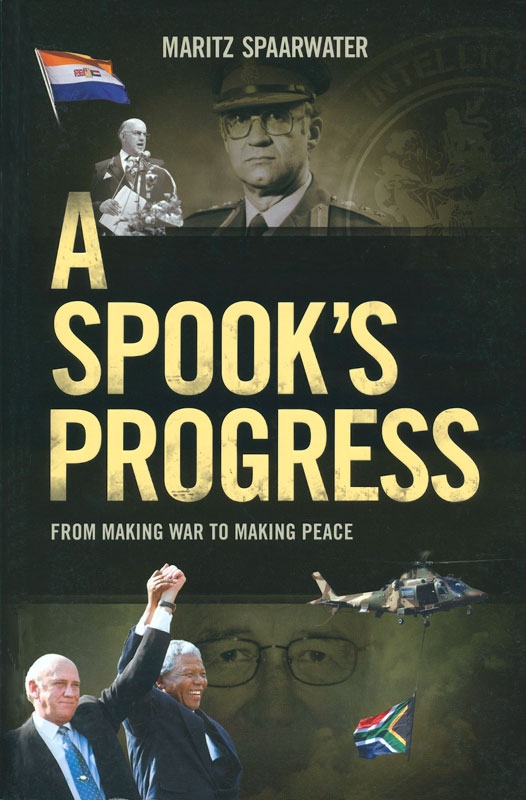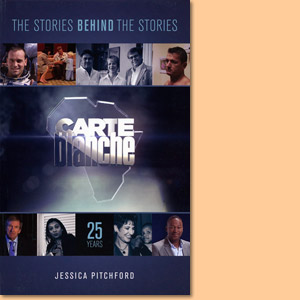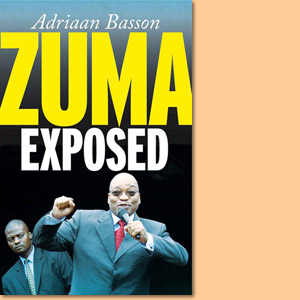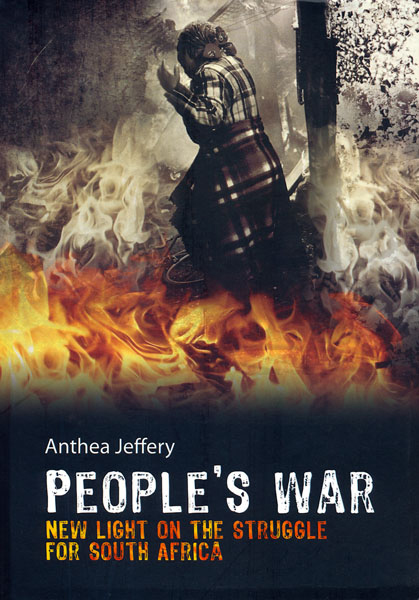A Spook's Progress, by Maritz Spaarwater
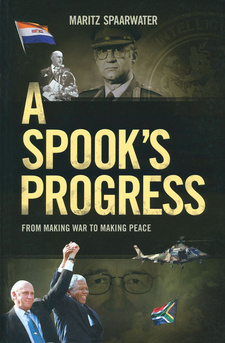
A spook's progress: From making war to making peace, by Maritz Spaarwater. Randomhouse Struik, Zebra Press. Cape Town, South Africa 2012. ISBN 9781770224377 / ISBN 978-1-77022-437-7
A Spook’s Progress is a fascinating and frank account of intelligence agent Maritz Spaarwater activity at a key time in South Africa's history.
South West Africa, now Namibia, was a captivating place. It took about a week there to get hooked for life. The country and its capital city, Windhoek, projected an ambience I had never experienced anywhere else. The varied natural beauty and wildlife, fascinating ethnic variety, interesting people, mild climate and palpable German-based cosmopolitanism were enthralling. A sense of gemutlichkeit pervaded society, among both black and white people. 1 have not been there for more than three decades and am still as entranced as ever. 1 was pleased to receive word that 1 would be sent from CSI to Windhoek again for three weeks in 1978. It became live months. Although domestically unsettling, the country and the excitement of the profound political developments there fascinated me, and I had no objections. When I arrived in Windhoek in 1978, Judge M.T. Steyn of the Supreme Court bench of the Orange Free State province in Bloemfontein and grandson of the venerable President M.T. Steyn of the Orange Free State Republic during the Anglo-Boer War was the administrator general of South West Africa, appointed by the South African government. A robust, powerful personality with a keen sense of humour, he regaled any audience he could find with amusing and sometimes highly irreverent stories (outside of the limelight) about South African politicians in particular. The local Joint Intelligence Coordinating Committee (JICC), of which I was a member, reported to him as and when necessary. He was always accessible and we were impressed by his swift grasp and own insights regarding the security situation in the country. He was a pleasant man, always courteous to and appreciative ot his underlings. He could also be quite imperious, as in his periodic decamping to his 'Summer Palace', as he called it, a marvellous historic building from the time of the German occupation of South West Africa that was later turned into a summer residence for administrators of South West Africa and visiting dignitaries in the pleasantly mild climate of Swakopmund on the coast, a most congenial place. It was an amusing pleasure to see him holding court and lording it in great style over his retinue. As the JICC we had the pleasure of also having to go on these sojourns to keep him briefed on developments. In early 1978, after convoluted and complex negotiations lasting some South West Africa years, agreement on a settlement pian for the war over South West Africa had been reached between all parties involved in the conflict. Apart from the main protagonists, South Africa and SWAPO, these included just about every state and grouping of states with interests in the region, including Cuba, the so-called Frontline (southern African) States, the British Commonwealth, the Organisation of African Unity and, crucially, the USA and USSR, all under the auspices of the secretary general of the UN, but all also with their own critical political, economic and strategic interests at stake. The Cold War was at its height, although it had at about that time started to become apparent that the USSR's internal situation was beginning to crumble and that they were developing doubts about their huge commitment to their allies in the South West Africa/Angola war and elsewhere. This became a determining factor in the cessation of hostilities as the Soviet economy, the mam source ot support to the communist forces in the region, was beginning to splutter towards an eventual implosion. The war had also become financially unsustainable for South Africa, lending urgency to the realisation that a negotiated settlement would have to be found for both South West Africa and the Republic of South Africa. (...)
This is an excerpt from the book: A Spook's Progress, by Maritz Spaarwater.
Title: A Spook's Progress
Subtitle: From Making War to Making Peace
Author: Maritz Spaarwater
Publisher: Randomhouse Struik
Imprint: Zebra Press
Cape Town, South Africa 2012
ISBN 9781770224377 / ISBN 978-1-77022-437-7
Softcover, 15 x 23 cm, 304 pages, several colour photographs
Spaarwater, Maritz im Namibiana-Buchangebot
A Spook's Progress
A Spook’s Progress is a fascinating and frank account of an intelligence agent’s life and work in South Africa.
Weitere Buchempfehlungen
Carte Blanche 25 Years. The Stories Behind the Stories
Carte Blanche burst onto the scene 25 years ago as a genre never before seen on South African television and tells the stories behind the stories.
Zuma Exposed
Zuma Exposed is the book President Jacob Zuma does not want you to read. It reveals the truth behind Jacob Zuma’s presidency of the ANC and South Africa.
Dinosaurs, Diamonds and Democracy. A short, short history of South Africa
A high quality production with sumptuous illustrations and good maps, Dinosaurs, Diamonds and Democracy - A short, short history of South Africa, is a coat pocket history book.
People's war: New light on the struggle for South Africa
People's war: New light on the struggle for South Africa reports on some 20500 killings as a result of the people’s war the ANC unleashed between 1984 and 1994.

